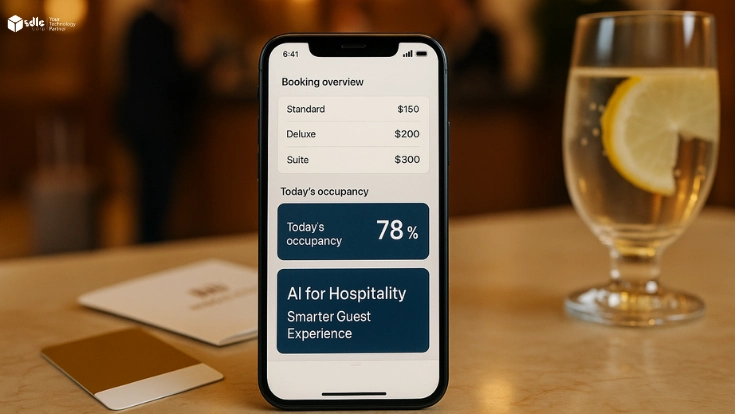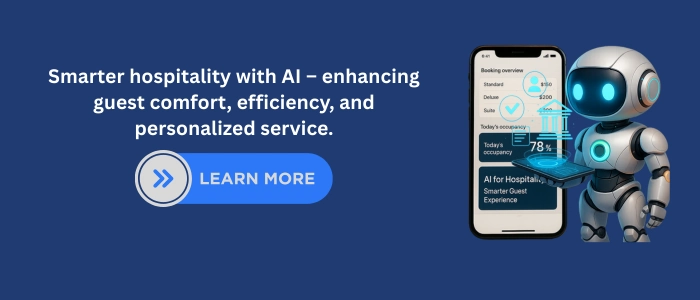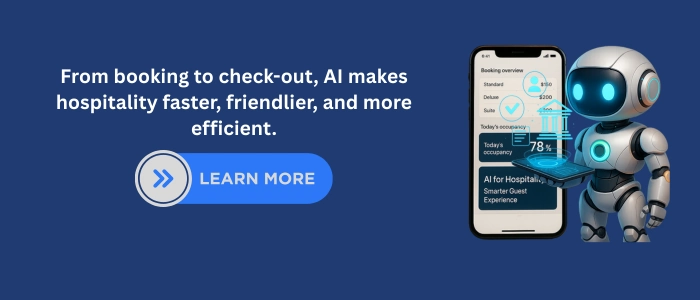Introduction
AI for Hospitality is no longer a futuristic idea. It is a practical tool that hotels, resorts, and restaurants are already using to improve service, optimize revenue, and reduce operational costs. Guests today expect fast responses, personalized recommendations, and smooth check-ins. Operators want efficiency, security, and ways to meet rising demand without adding unnecessary expenses.
This balance is possible with Hospitality AI Solutions. From front desk automation to back-end analytics, the use of AI in Hotel Industry is transforming how businesses manage their operations. The result is not only better service for customers but also measurable improvements in profitability.
Suggested read: Responsible AI Development by SDLC Corp for deeper insights into ethical AI adoption.
In this blog, we will examine practical applications, benefits, challenges, and future trends of AI in hospitality. Special focus will be given to AI-powered guest experience, hotel revenue management AI, and AI hospitality chatbots, as they represent some of the most impactful innovations in the sector.
AI and Hospitality: A Natural Fit

Hospitality depends on delivering memorable experiences. AI systems can learn from customer data and then recommend or act in ways that feel personalized. Unlike traditional software, these models adapt over time.
For example, AI for Hospitality allows hotels to predict peak booking times, adjust pricing dynamically, and reduce the chance of overbooking. In luxury resorts, it helps with personalization at scale by remembering guest preferences.
The partnership between human staff and AI tools is not about replacing service. Instead, it is about giving employees the right insights at the right time. This makes them more capable of delivering quality interactions.
Hotels like Marriott and Hilton have already started experimenting with Hospitality AI Solutions that analyze global booking data, loyalty program behavior, and even sentiment from online reviews. This integration has helped them streamline operations while offering travelers experiences that feel more tailored than ever before.
Research shows that over 70% of travelers prefer hotels that anticipate their needs. AI helps operators meet this expectation consistently while easing the workload on staff. In practice, this means guests enjoy smoother experiences while hotels see better reviews and loyalty.
Transforming Guest Experience

One of the strongest drivers of Hospitality AI Solutions is the goal of improving the guest journey. From the moment a traveler starts looking for a hotel until they check out, AI can create smoother experiences.
- Personalized recommendations: AI analyzes past bookings and behavior to suggest rooms, amenities, or packages.
- Smart check-in and check-out: Mobile apps powered by AI allow contactless entry, reducing wait times.
- Room customization: Guests can adjust lighting, temperature, and entertainment using AI hospitality chatbots connected to in-room devices.
An AI-powered guest experience goes beyond convenience. It builds loyalty by making guests feel understood and valued. This form of personalization at scale was once limited to luxury hotels but is now available in mid-tier chains as well.
Case studies highlight how some boutique hotels are leveraging AI to deliver hyper-personalized experiences. For example, a property in Singapore uses AI to track dining preferences, then adjusts room service menus accordingly. In Spain, a resort uses AI-driven mobile apps to suggest cultural events based on guest profiles.
These use cases show how AI in Hotel Industry blends technology with hospitality’s human side. Instead of overwhelming staff with requests, AI automates personalization in the background.
Hotel Revenue Management with AI

Revenue optimization is another core application of AI in Hotel Industry. Traditional methods relied on spreadsheets and fixed seasonal adjustments. With hotel revenue management AI, operators now make decisions based on real-time data.
Key improvements include:
- Dynamic pricing: AI adjusts room rates based on demand, competitor pricing, and local events.
- Demand forecasting: Accurate predictions of occupancy help with staffing and resource allocation.
- Upsell opportunities: AI can suggest upgrades during booking, such as suites or premium services.
By combining financial data with guest behavior, hotels maximize revenue without sacrificing guest satisfaction. For many operators, this balance is what makes AI adoption a priority.
Accor Hotels introduced AI-driven pricing tools across its European portfolio, resulting in a 7% increase in revenue per available room. Smaller boutique hotels in Asia have reported similar results using AI models that factor in local festivals, weather conditions, and competitor promotions.
The role of hotel revenue management AI is becoming even more critical in the post-pandemic market. Travel demand is unpredictable, and AI provides agility to react quickly without outdated static models.
Related blog: Generative AI for Hospitality
AI Hospitality Chatbots and Customer Support
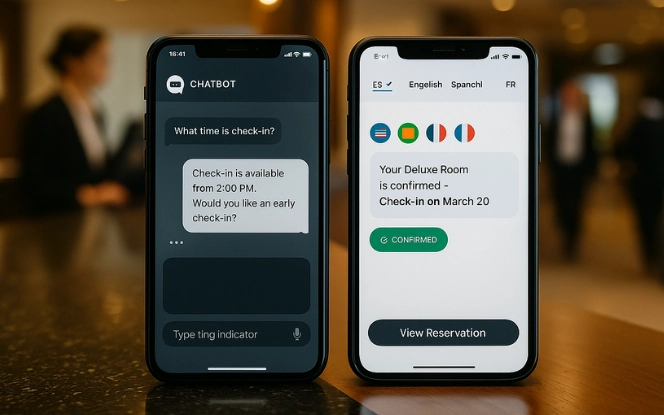
Support services are where AI delivers immediate value. AI hospitality chatbots respond to routine questions, handle booking modifications, and provide local recommendations.
Benefits include:
- 24/7 availability: Guests can interact at any hour.
- Multilingual service: AI supports global travelers without needing large translation teams.
- Reduced workload: Staff focus on complex requests instead of repetitive tasks.
Unlike early chatbots that were rigid, modern solutions use natural language processing. They understand intent and can escalate to human staff when necessary. This ensures that automation improves service instead of frustrating customers.
For example, Hyatt integrated multilingual chatbots to serve guests across Asia, Europe, and North America. The result was a 30% reduction in call center volume and faster resolution of inquiries.
Another case is OYO Hotels, where AI-driven chatbots provide seamless check-in instructions and manage booking changes instantly. This kind of AI-powered guest experience proves valuable for both guests and staff.
You may also like: Generative AI Consulting Services
Operational Efficiency and Back-End Support
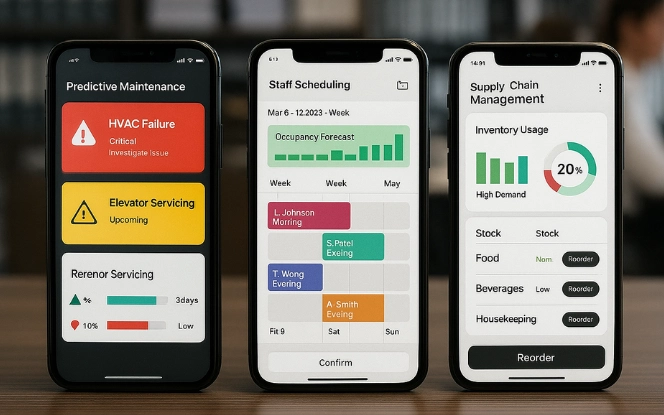
While guest-facing services get most attention, Hospitality AI Solutions also improve internal operations. AI manages inventory, monitors energy use, and detects fraud in payment systems.
Examples include:
- Predictive maintenance: AI predicts when HVAC systems or kitchen equipment might fail, reducing downtime.
- Staff scheduling: AI balances staff needs based on occupancy forecasts.
- Supply chain optimization: Hotels order only what they need, reducing waste.
Large chains like IHG use AI to track and manage energy consumption across properties, cutting costs while improving sustainability. Smaller hotels benefit as well; predictive maintenance reduces disruptions by up to 20%.
The efficiency gains translate into cost savings, which can be reinvested in guest services. In an industry with tight margins, these savings are a major advantage.
AI also helps security. Fraud detection models flag unusual payment patterns, protecting both operators and guests. Combined with predictive tools, this creates a safer and more reliable environment for hotel management.
Also read:Autonomous AI Workflows
Challenges and Considerations
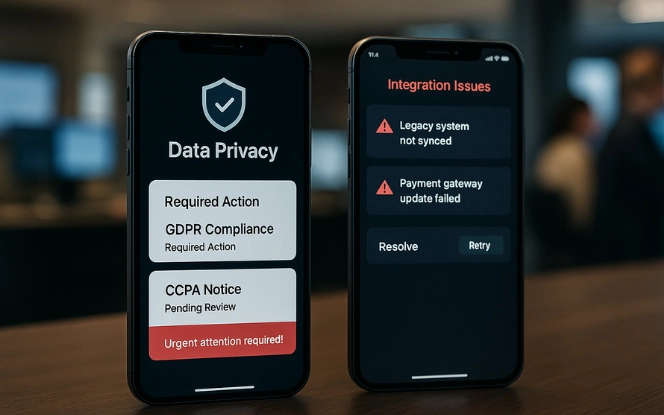
Despite benefits, adopting AI in Hotel Industry comes with challenges.
- Data privacy: Hotels must protect sensitive guest information.
- Integration: Legacy systems often struggle to connect with AI platforms.
- Training: Staff need guidance to use AI tools effectively.
Ethical concerns are also rising. Guests want to know how their data is collected and used. Transparency builds trust, and hotels must prioritize this in communication strategies.
A 2022 survey revealed that 65% of travelers worry about how their personal data is stored by hotels. This underscores the importance of transparent policies and responsible use.
Regulation is another factor. Governments are introducing stricter rules on data handling and AI deployment. Hotels must stay compliant or risk penalties that can offset the financial benefits of adopting AI.
The Future of AI in Hospitality
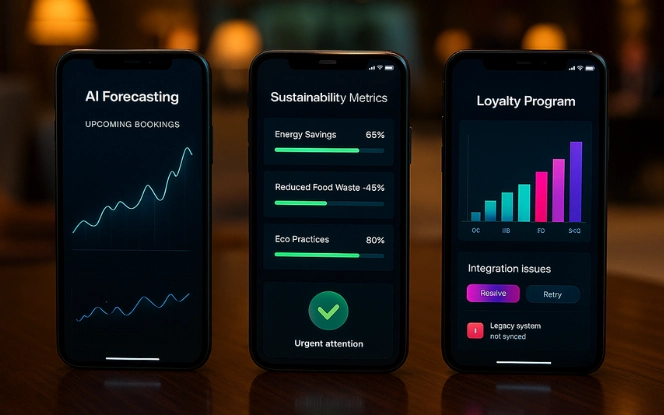
Looking ahead, AI for Hospitality will continue to evolve. Generative models may assist in creating marketing content or personalized travel itineraries. Predictive systems will make revenue optimization more accurate.
We can also expect improvements in sustainability. AI will monitor energy consumption, reduce food waste, and support eco-friendly practices.
Most importantly, the human touch will remain central. AI will handle data-driven tasks, while staff focus on empathy and creativity. Hotels that succeed will be those that balance automation with personal service.
McKinsey research shows that companies combining AI with human service see up to a 20% improvement in customer satisfaction. This trend is expected to continue as competition grows.
Emerging technologies such as voice assistants, digital concierges, and AI-driven loyalty programs will become mainstream. Combined, they will further elevate the AI-powered guest experience.
Conclusion
The adoption of Hospitality AI Solutions is no longer optional. From AI-powered guest experience enhancements to hotel revenue management AI and AI hospitality chatbots, the industry is entering a new era of service delivery.
For hotel operators, the priority should be strategic integration. This ensures benefits are realized without overwhelming staff or risking guest trust.
AI is not about replacing people but about helping them deliver more value. With proper use, it leads to higher efficiency and better guest satisfaction. Hotels that embrace these tools now will be positioned for long-term success.
Hire AI Development Services with SDLC Corp to bring reliable, transparent, and effective AI applications into your business today.
FAQs
How Is AI For Hospitality Changing The Guest Experience?
AI for Hospitality enhances personalization, automates check-ins, and supports real-time services. Guests benefit from an AI-powered guest experience that makes their stay seamless.
What Are The Benefits Of Hospitality AI Solutions For Hotels?
Hospitality AI Solutions improve revenue management, streamline back-end operations, and reduce costs. They also enable hotels to handle demand fluctuations with accuracy.
Why Is AI In Hotel Industry Important For Revenue Growth?
By using hotel revenue management AI, hotels adjust pricing dynamically, predict occupancy, and optimize upsell opportunities. This ensures steady revenue growth while maintaining guest satisfaction.
How Do AI Hospitality Chatbots Support Staff And Guests?
AI hospitality chatbots provide 24/7 support, handle common guest queries, and manage booking updates. This allows staff to focus on more complex guest needs.
What Future Trends Can We Expect In AI For Hospitality?
Future applications of AI in Hotel Industry include predictive maintenance, sustainable energy use, and greater reliance on personalized hospitality AI solutions for guest loyalty.

